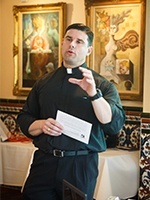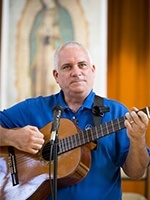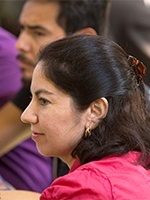By Tom Tracy - Florida Catholic

Photographer: TOM TRACY | FC
Father Rafael Capo, director of the Miami-based SEPI (Southeast Pastoral Institute), talks to diocesan Hispanic ministry directors at a regional Encuentro held Oct 17-20 in St. Augustine, Fla.
Some 150 participants were on hand in St. Augustine Oct. 17-20, representing 16 dioceses and 17 nationalities from throughout the Southeastern U.S.
- �This is a historical moment where Pope Francis is calling for mission, for the new evangelization of going out to the community but that has been in our inner language and is nothing new for us in Hispanic ministry. Maybe now as we work together in this context of cultural diversity in the Church it becomes ever more important. SEPI is excited to begin new partnerships and programs for evangelization and faith formation so today we launched a new online formation program with the University of Notre Dame. The pilot program has proven to be very well accepted by our communities.� � Piarist Father Rafael Cap�, SEPI director
- �We need to see more Hispanics in the seminaries and in the convents. The bishops get seminary candidates from families and we as lay people have the responsibility to do our job to promote vocations from within our families and send those vocations to the bishop. We are also working on our diocesan pastoral plan together as Hispanics, a pastoral plan addressing faith formation, sacrament participation, vocations and how we Hispanics relate to other organizations in the community. Internet and Catholic radio are absolutely an important way especially with the youth: They teach us how to use the media. We have a huge opportunity to evangelize our communities and we also work with our diocesan newspaper.� � Gustavo Valdez, director of Hispanic Ministry, Diocese of Charleston, S.C.

Photographer: TOM TRACY | FC
Deacon Juan Carlos Pagan, program coordinator in Hispanic Ministry for the Diocese of Lafayette, La., leads music at a SEPI-sponsored Hispanic ministry Encuentro held Oct 17-20 in St. Augustine, Fla.
- �Nowadays the Hispanic community has more awareness of being prepared (for ministry) and willing to organize ourselves. That has come about recently. Thirty five years ago this was unthinkable when Father Mario Vizcaino (founder of SEPI) first went around meeting the Mexican people in the communities of the South. I was 17 years old when I first met Father Vizcaino. Today we know we are a growing minority and there is a commitment to get the tools to lead our Catholic Church in the country. We have mission territory here (in the South) and we need missionaries to respond to the calling.� � Olga Lucia Villar, director of Hispanic Ministry, Archdiocese of Mobile, Ala.
- �The new evangelization may seem new in the American setting but this is old news for SEPI and the way that SEPI works. When I was a kid it was instilled in us that you get out and look for people � it is not enough only to be welcoming. The Hispanic community in Lafayette is the result of a little mobile team that SEPI had that went knocking on doors, found some Hispanics, gathered them together and had a Mass. Slowly that grew because somebody (Father Vizcaino) took the initiative to drive 700 miles to find the Hispanics. One on one contact is still a most effective way to invite people to church.� � Deacon Juan Carlos Pagan, program coordinator in Hispanic Ministry, the Diocese of Lafayette, La.
- �Before I became more technologically wise I used to send written letters by regular mail to our leaders about regular meetings, and one time people said they didn�t receive my letter or they forgot to read it, and I asked them how else can I let you know something: Text messages. The first thing working people do is get a cell phone. That is how we communicate and it is a working tool because people are constantly in touch with their cell phones.� � Cristina LeBlanc, director of Hispanic Ministry, Diocese of Lafayette, La.

Photographer: TOM TRACY | FC
Eva Gonzalez, Hispanic ministry director for the Archdiocese of Louisville, Ky., listens during a break-out session for Hispanic ministry leaders at a regional Encuentro held Oct 17-20 in St. Augustine, Fla.
- �I don�t like to talk about numbers (in Hispanic ministry) because people migrate due to jobs and those numbers change. We have people from different backgrounds including Mexico, Peru and Central America, for example. Last July, we launched a Facebook, Twitter and Spanish-language digital version of our archdiocesan newspaper. Emails also seem to work well because the electronic communications give people more options and preferences. All our events, celebrations and retreats are announced in the digital section of our newspaper, sending you to links with more information. And sometimes personal phones calls or meeting in person is still the best thing.� � Eva Gonzalez, Hispanic ministry director, Archdiocese of Louisville, Ky.
- �This Encuentro is very important because I get together with a lot of people working in the dioceses and new diocesan directors who may not know what we can offer and how we can help them start the ministry or make them stronger as we did in Memphis, Tenn., and Pensacola-Tallahassee, for example. If you don�t do that you are not taking care of a huge segment of your Hispanic population who might go somewhere else. Youth and young adult groups for immigrants is like a family and it gives them a way of living their faith.� � Juan Jose Rodriguez, youth and young adult ministry coordinator at SEPI.
- �We Anglos have maybe considered ourselves the host (to Latino immigrants) but we need to find a new, unifying narrative in which we are encouraging each other in our walk of faith and in which no one is a second-class citizen at the eucharistic table. The preaching of Jose (Pepe) Prado (director of Escuela de Evangelizaci�n San Andr�s) at this retreat was really good because he was encouraging us to love the word of God and to remember that ignorance of the scripture is ignorance of Christ. He likened it to our oil reserves. I really care about the ecumenical dialogue with our Protestant brothers, and I think it is the scriptures that will help us with those conversations.� � Esther Terry, Coordinator of Camino at the University of Notre Dame

